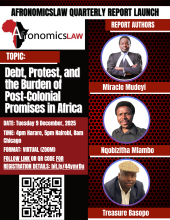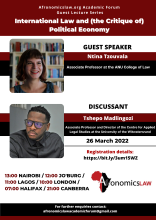Sovereign Debt News Update No. 159: Arbitration Claims Arise in Guinea’s Bauxite Economy: The Politics of Mineral Sovereignty
Guinea occupies a structurally significant position in the global minerals economy as the world’s largest holder of bauxite reserves and second leading producer of the ore, which is indispensable for aluminium production and increasingly recognised as strategically important to global industrial supply chains. This update examines Guinea’s intensifying resource nationalism in the global bauxite sector, focusing on the revocation of mining licences, the resulting high-value international arbitration claims, and the government’s planned legal defence. It situates these developments within broader African debates on bauxite’s strategic importance, mineral governance, and efforts to reclaim sovereign control and value from critical raw materials.

